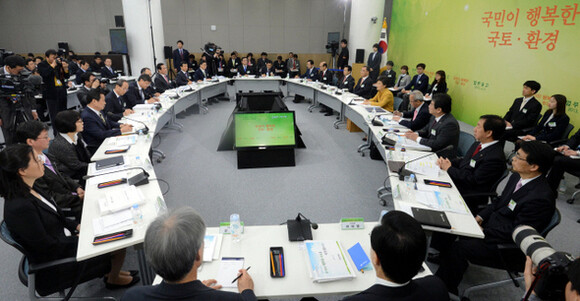hankyoreh
Links to other country sites 다른 나라 사이트 링크
Government scaling back pledges to cut greenhouse gas emissions

By Kim Jeong-su, environment correspondent
The South Korean government indicated that it would recalculate its 2020 projection for greenhouse gas emissions, which is the standard for implementing the greenhouse gas reduction goal was announced to the international community. The move is expected to create controversy both inside and outside of Korea about the country’s failure to keep its word.
On the morning of Apr. 4, the Ministry of the Environment reported to South Korean President Park Geun-hye at the government building in Sejong City. In the description of its 2013 activities, the Ministry said, “In order to create a new framework for implementing our national greenhouse gas reduction goals, we will make another prediction of the expected greenhouse gas emissions by Aug. 2013.” This information appears to have been included in the work report after President Park directly asked Yoon Seong-kyu, Minister of Environment, to create a roadmap for the reduction of greenhouse gases.
At the climate conference held in Copenhagen, Denmark, in 2009, the Lee Myung-bak administration announced the goal of achieving a 30% reduction in the projected 2020 greenhouse gas emissions. The 2020 emissions projection, which is the standard used to measure achievement of this goal, was calculated to be 813 million tons. According to this projection, the greatest amount of greenhouse gases that South Korea can emit in 2020 is 30% of the figure, or 569 million tons.
However, if the government inflates the projected greenhouse gas emissions, as was indicated at the briefing, the total amount of greenhouse gas that Korea may emit will increase even if it maintains the projected reduction rate of 30%. This is the exact trick that environmental organizations predicted when they saw President Lee receive praise from the international community for his promise to reduce greenhouse gases and then show no interest in actually taking measures to carry out his promise.
“The greenhouse gas emissions in 2010 exceeded predictions, and it is very likely that the 2012 emissions will prove to have exceeded the forecasted figures as well,” Yoon said during a press conference after the Mar. 3 work report. “If we are to keep our promise to the international community, greenhouse gas emissions must stop increasing by 2015. However, the previous administration did nothing to reduce greenhouse gas emissions. We have to review whether it is possible for us to keep the promise that the Lee administration made and look for a way to achieve it.”
“Increasing the projections in a bid to achieve the goal is a bit like agreeing to run a 100m dash and then suddenly changing the length to 80m,” responded An Byeong-ok, chief of the Institute for Climate Change Action. “This will have a negative effect on the credibility that South Korea has gained in the international community. It will also limit our right to speak up during future negotiations about climate change.”
The Ministry also announced that it would be initiating a countrywide warning system for ultrafine particles (PM2.5) starting in 2014 instead of in 2015, as it had originally planned.
The Ministry also announced a variety of other major plans it hopes to introduce. These include an off-site effect assessment system, which would mandate a pre-installation review of the effect that chemical-handling facilities will have on their surrounding areas. The current permanent licensing system for pollutant-emitting facilities will be changed so that the license will require renewal. A “three strikes” system will be introduced whereby a company with three chemical accidents would have its business license revoked. Finally, in order to encourage recycling, a penalty will be imposed on burying and incinerating waste. It is expected that the Ministry will have to overcome major opposition from industry before such systems are actually implemented, however.
Please direct questions or comments to [english@hani.co.kr]

Editorial・opinion
![[Editorial] Penalties for airing allegations against Korea’s first lady endanger free press [Editorial] Penalties for airing allegations against Korea’s first lady endanger free press](https://flexible.img.hani.co.kr/flexible/normal/500/300/imgdb/original/2024/0502/1817146398095106.jpg) [Editorial] Penalties for airing allegations against Korea’s first lady endanger free press
[Editorial] Penalties for airing allegations against Korea’s first lady endanger free press![[Editorial] Yoon must halt procurement of SM-3 interceptor missiles [Editorial] Yoon must halt procurement of SM-3 interceptor missiles](https://flexible.img.hani.co.kr/flexible/normal/500/300/imgdb/child/2024/0501/17145495551605_1717145495195344.jpg) [Editorial] Yoon must halt procurement of SM-3 interceptor missiles
[Editorial] Yoon must halt procurement of SM-3 interceptor missiles- [Guest essay] Maybe Korea’s rapid population decline is an opportunity, not a crisis
- [Column] Can Yoon steer diplomacy with Russia, China back on track?
- [Column] Season 2 of special prosecutor probe may be coming to Korea soon
- [Column] Park Geun-hye déjà vu in Yoon Suk-yeol
- [Editorial] New weight of N. Korea’s nuclear threats makes dialogue all the more urgent
- [Guest essay] The real reason Korea’s new right wants to dub Rhee a founding father
- [Column] ‘Choson’: Is it time we start referring to N. Korea in its own terms?
- [Editorial] Japan’s rewriting of history with Korea has gone too far
Most viewed articles
- 160% of young Koreans see no need to have kids after marriage
- 2Presidential office warns of veto in response to opposition passing special counsel probe act
- 3[Editorial] Penalties for airing allegations against Korea’s first lady endanger free press
- 4Japan says it’s not pressuring Naver to sell Line, but Korean insiders say otherwise
- 5Months and months of overdue wages are pushing migrant workers in Korea into debt
- 6[Special Feature Series: April 3 Jeju Uprising, Part III] US culpability for the bloodshed on Jeju I
- 7[Column] America must frankly own up to role in tragic Jeju April 3 Incident
- 8‘My mission is suppression’: Jeju blood on the hands of the US military government
- 9Dermatology, plastic surgery drove record medical tourism to Korea in 2023
- 10[Guest essay] Maybe Korea’s rapid population decline is an opportunity, not a crisis